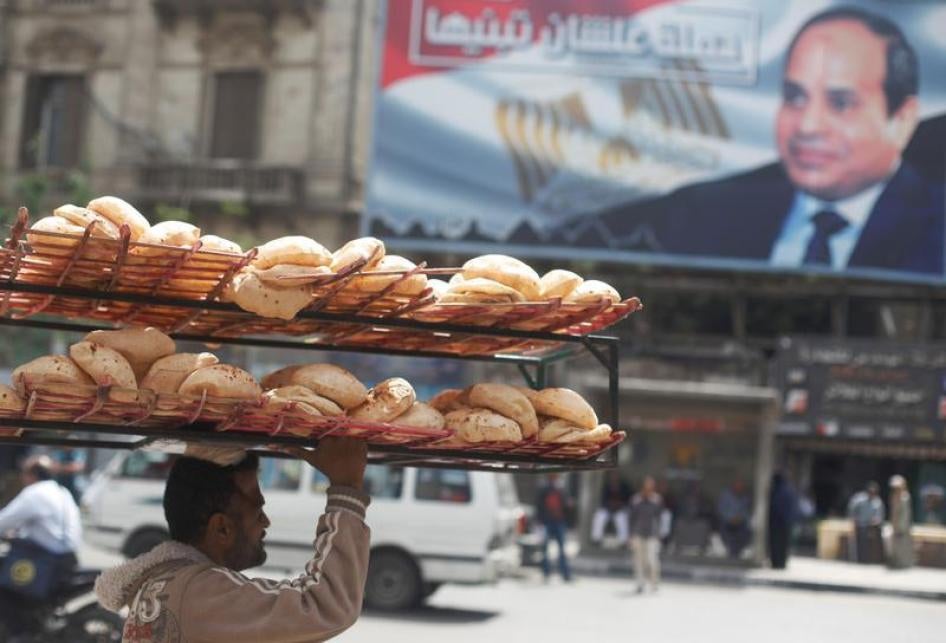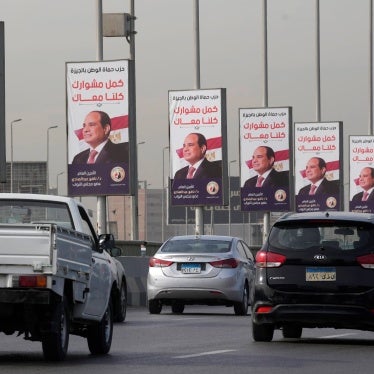In no conversation with Egyptians in recent months can one avoid hearing how the prices of basic food and commodities are rapidly rising on daily basis, sometimes changing literally while someone is in the shop. In recent weeks, the foreign currency crisis has pushed the exchange rate in the black market to exceed double the official rate of 31 pounds per $1 USD. Millions of Egyptians’ economic and social rights, including to food and an adequate standard of living, have been in jeopardy due to inflation that hit a 40 percent record in recent months. This is all just the tip of the iceberg of Egypt’s soaring and protracting economic and financial crisis.
Even worse, there seems to be no plausible way out. While the Israel-Hamas war in Gaza has diverted some attention from the dire crisis in Egypt, President Abdel Fattah Al-Sisi’s government has resorted to what it does best: desperate, time-buying tactics, without addressing the root causes of the crisis, spiraling into a self-perpetuating cycle of failure.
This was the case, for example, when the government, sensing the visibly escalating public discontent, anxiously moved up presidential elections to December 2023 ahead of the usual date in March 2024, even though no figure or group was ever given the chance to fairly contest the election. In January, the parliament swiftly approved government-proposed legislation that will give the military, the de-facto ruler of the country, further power to prosecute civilians in military courts in wide ranging economy-related offenses and whatever other offenses the president deems to be undermining “national security requirements,” adding to the pile of abusive laws and courts use to punish dissent, extort wealth, and pressure large businesses to give the military part of their proceeds.
But Al-Sisi has recently appeared nervous. On September 30, drawing a parallel to the Great Chinese Famine that killed millions in the 20th Century, Al-Sisi literally told Egyptians that it is acceptable for them to face famine or die of hunger to achieve his vision of development. The reason he appears nervous is that the very premise of Al-Sisi’s rule has been crumbling in front of his eyes.
When Al-Sisi rose to power on the heels of a military coup he orchestrated in 2013, he implied in multiple statements that Egyptians would need to give up their civil and political freedoms as he focused on bringing about prosperity and development. Al-Sisi has always spoken as if economic and social rights are at odds with political rights and civil liberties, and that peaceful protests and expression are generally conspiracies that only bring chaos.
Ten years after the military coup and nine years into his presidency, Al-Sisi’s distorted world view unsurprisingly never came to fruition. His government has violently quashed peaceful dissent and annihilated many basic freedoms, in ways that are far worse than any autocracy in Egypt’s recent history, while the promises of prosperity and development are little more than a mirage, and poverty under Al-Sisi’s rule has only increased.
While Al-Sisi clearly seems aware of the depth of the economic crisis, his statements have mostly revolved around absolving himself from responsibility, blaming external factors, and scolding Egyptians for their democratic aspirations and the 2011 revolt that brought about the end of 30 years of President Hosni Mubarak’s autocratic rule. Joining a long list of autocrats who view development not as an unalienable human right, but as a benefit or a gift from the ruler to people, he has repeatedly told Egyptians that the solution is to continue to sacrifice their rights and be patient otherwise criticism and opposition can “destroy the country.”
This is happening even though his government has received billions of dollars in generous support from his rich Saudi and UAE benefactors and large loans and technical assistance from the International Monetary Fund (IMF), the World Bank, and others. Rather than such tremendous support leading to concrete reforms, these loans have become mostly a burden for generations to come as, according to Bloomberg, Egypt is more at risk of debt crises than any other country in the world besides Ukraine.
And while more Egyptians suffer to secure their basic needs, Al-Sisi has embarked on lavish vanity projects that he himself has at times acknowledged lacked feasibility studies and that he nevertheless has pushed to boost Egyptians’ “morale.” Numerous studies show how Al-Sisi’s military has expanded its enormous invasion of consumer markets, benefiting from an uneven playing field and a lack of civilian oversight or scrutiny, leading to corruption and squandering of public assets. This has been one of the main issues that remain insufficiently addressed, including in the currently stumbling $3 billion IMF loan.
Moreover, Al-Sisi’s government, with the support of the IMF, has removed many food and fuel subsidies without sufficient measures to scale up the country’s social security system and mitigate the harm. Currently, social assistance cash transfer programs hardly cover a third of the 60 million people living near or in poverty out of the 100-million population. The cash assistance has also increasingly lost its purchasing power to inflation.
Egypt’s economic crisis is deep and multifaceted, but it is also in many ways the product of a political deadlock in which a military-backed, unaccountable system of governance has crushed prospects of peaceful rotation of power.
Al-Sisi has intentionally refused to create a political party or head one of the pro-Sisi parties that dominate his subservient parliament. Instead, he relies on naked coercion and the military and security services as his main vehicles of control. The reason is that he has been seeking to avoid what he perceives to be Mubarak’s mistake of ruling through a political party that instituted business oligarchy and cronyism. Al-Sisi instead focused on dismantling the state’s independent institutions and enhancing coup-proofing mechanisms while relying almost entirely on the military to run the country.
In return, the military has entrenched its rule as a political and economic player in unprecedented ways, including by introducing constitutional and legal amendments that make it the main custodian of political life and allow the generals to accumulate more wealth in opaque military businesses. But this leaves the military in the uncomfortable position of receiving a significant share of public anger for failed economic policies in a vacuum of political alternatives.
Anecdotal evidence shows that the level of public dissatisfaction with Al-Sisi after nine years in power is reminiscent of what Mubarak needed 30 years to accumulate. Al-Sisi’s government still seeks external support and validation as a means of survival.
Blown-up regional events have multiple times helped Al-Sisi’s government since 2013 as his benefactors in Western governments have frequently favored short-sighted solutions for the rising security challenges and migration across the Mediterranean over human rights and democracy. Concurrently, this is the case for reported new and ongoing deals that may go forward soon, with the European Union, IMF and/or World Bank, as Al-Sisi is still betting on the same old tactics, using Egypt’s size and geopolitical leverage, albeit weakened, to convince Western capitals to pour more financial assistance on the backdrop of regional crises and wars such as in Gaza, Sudan and Libya. But these all cannot be more than time-buying tactics. This applies also to the vague $35 billion investment deal with the United Arab Emirates which the government celebrated in late February as a “victory”. While such politically-motivated support has proven to only increase the leverage of Gulf allies on Egypt’s ruling class with little or no actually sustained gains for millions of Egyptians.
Some contend that the countdown for a social and/or political explosion has already begun. But what is certain is that Al-Sisi has watered the seeds of his own failure. By trampling on the rule of law, independence of state institutions, and the free press, he has destroyed the very pillars needed for building a strong economy based on accountability and favorable environment that can attract strong investments rather than barely get by on unsustainable loans. It is also very unlikely that Al-Sisi will reverse course as his government has shown little to no capacity for self-reflection or reform. His government has been fearful of the slightest political opening snowballing, and it has frequently resorted to coercion to keep the lid on, which in turn creates more grievances and makes reform prospects, harder and harder. In many ways, Al-Sisi has caged himself in.
The longer Al-Sisi continues to rob the country of its potential, the more the danger to long-term stability in Egypt and the higher the price that must be paid to repair the future.










